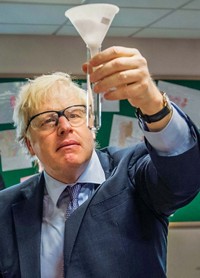Advertisement
Grab your lab coat. Let's get started
Welcome!
Welcome!
Create an account below to get 6 C&EN articles per month, receive newsletters and more - all free.
It seems this is your first time logging in online. Please enter the following information to continue.
As an ACS member you automatically get access to this site. All we need is few more details to create your reading experience.
Not you? Sign in with a different account.
Not you? Sign in with a different account.
ERROR 1
ERROR 1
ERROR 2
ERROR 2
ERROR 2
ERROR 2
ERROR 2
Password and Confirm password must match.
If you have an ACS member number, please enter it here so we can link this account to your membership. (optional)
ERROR 2
ACS values your privacy. By submitting your information, you are gaining access to C&EN and subscribing to our weekly newsletter. We use the information you provide to make your reading experience better, and we will never sell your data to third party members.
Employment
UK surprises with scientist immigration changes
Prime minister proposes removing visa cap, loosening other requirements
by Benjamin Plackett, special to C&EN
August 21, 2019

UK prime minister Boris Johnson has vowed to open up the immigration system currently reserved for top-level scientists moving to the UK from outside the European Union.
The visas in question are called Exceptional Talent or Tier 1 visas. At the moment, the number of such visas is capped at 2,000 per year. Johnson proposes scrapping that limit and opening the visas to researchers coming from the EU.
“The current system creates barriers across both academia and industry,” says Jo Reynolds, the Royal Society of Chemistry’s director of science and communities. “It is particularly challenging for smaller companies, which account for 96% of industry in the chemical sciences in this country.”
To qualify for a Tier 1 visa, an applicant must be endorsed as either an established industry leader or an emerging leader by a designated organization in their field. For example, scientists can apply to either the Royal Society or the Royal Academy of Engineering for their recommendation.
The prime minister wants to expand the group of organizations that are licensed to endorse immigration candidates. He also wants to remove the requirement that visa recipients have a job offer before entering the UK.
EU citizens currently make up 16% of the research workforce at British universities, according to the Royal Society, which has led to concerns that Brexit could lead to a shortage of skilled workers.
Nevertheless, the policy change comes as somewhat of a surprise. Boris Johnson recently took over the premiership from Theresa May in what is largely seen as a shift towards a harder Brexit—one in which the UK would leave the EU’s single market and customs union. Commentators have often assumed that a harder Brexit would lead to tighter immigration controls.
The move to make immigration easier for scientists is cautiously welcomed by Reynolds.
“It is encouraging to see that the government has acknowledged some of the challenges facing UK science,” she says. “We look forward to seeing the full details of the proposals, so we can continue to offer our support in achieving a system that works for everyone.”




Join the conversation
Contact the reporter
Submit a Letter to the Editor for publication
Engage with us on Twitter